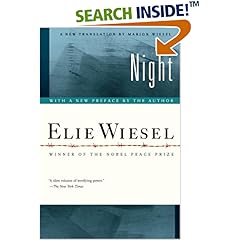 If you come across someone who wonders whether or not human beings are totally depraved, hand them a copy of this book. Night is a short book describing Wiesel’s year in Auschwitz and Buchenwald.
If you come across someone who wonders whether or not human beings are totally depraved, hand them a copy of this book. Night is a short book describing Wiesel’s year in Auschwitz and Buchenwald.
The book begins with Wiesel’s family living peacefully in Transylvania during the later years of World War II. Trouble seems distant though rumors abound. The Jewish community in Sighet continues to live and love just as before. Wiesel tells about a devout Jewish man who had witnessed the horrors of a concentration camp and escaped. Upon arrival in the village, he began to warn everyone of the impending danger. But the villagers scoffed at his warnings. They did not believe that humans were capable of such evil. Even after the Jews were moved to the ghetto, Wiesel describes his family as still hoping and trusting that nothing worse would take place.
Then, the concentration camp. Wiesel describes in horrific detail the “chimney,” – the place where Jews (even babies) were thrown alive into a blazing fire. Wiesel rebels against God. He refuses to fast on Jewish holy days. He questions the existence of God. The human evil of Auschwitz is too overwhelming to comprehend. Wiesel claims that human words cannot express the suffering he experienced.
Throughout the narrative, Wiesel expresses shock and dismay at the evil of his persecutors. But intermingled into his account is his surprise at his own depravity manifested in his basest instincts. His recollections are littered with regret, with anger, and remorse.
Wiesel’s account forces the reader wrestle with questions about human depravity, God’s sovereignty, the reason for suffering. The most disturbing scene in the book takes place when an innocent boy only 12 years old is forced to die, though he did not commit the crime for which he is punished. He and three others are placed on the gallows and hanged. The rest of the prisoners are forced to walk by and look squarely into the faces of the executed. But “the third rope was still moving. The child, too light, was still breathing… And so he remained for more than half an hour, lingering between life and death, writing before our eyes…”
“Behind me, I heard the same man asking, ‘For God’s sake, where is God?'” And from within me, I heard a voice answer: ‘Where He is? This is where – hanging here from this gallows…'”
This account is a turning point for Wiesel. In his thoughts at that time, God is dead. Yet, as a Christian, I sense something deeper in this story. In the midst of human suffering and evil, I too look to an Innocent One dying an excruciating death. And when considering the depth of human evil and the love of a good God, I too ask, “Where is God?” and then see the form of a cross. “He is here, hanging on this tree…”
written by Trevin Wax. © 2007 Kingdom People Blog


















